Merry Christmas and a Happy New Year to the HIStalk crowd. I wish you the joys of the season!
Monday Morning Update 12/19/11
From EpicNews: “Re: HCA. Any rumors about HCA signing with Epic?” I’ve mentioned here several times that HCA is putting up an Epic pilot as they choose between that option and upgrading Meditech. I haven’t heard anything more than that, although a couple of less well-placed rumors seem to think Epic is the likely choice (I’m guessing that’s due to Epic’s track record rather than any real insider knowledge.)
From CIO Lookin’: “Re: company that has a contracts database. One of your sponsors offers a database of vendor contracts with full details about pricing and terms. I don’t remember the company’s name. Can you help?” It’s CapSite. Very useful. It’s cool looking at the actual scan of the contracts but also having all the numbers broken out into a worksheet for easier review.
Aetna reveals at an investor conference Thursday that it acquired mobile app developer Healthagen “about a month and a half ago.” Aetna says it will add cost estimation functions for patients to its iTriage app. Aetna’s chairman, president, and CEO also told investors that the company will make the software development kit for the Medicity iNexx platform available free so that anyone can write apps for it.
Micky Tripathi’s breach article on HIStalk Practice has raised the interest of The New York Times, which will apparently be running a story about his experience in Monday’s business section.
My Time Capsule editorial from 2006 for this week: Embrace FDA Oversight If You Want Clinical — not Clerical — Systems. A snippet:
It’s like Lucy working on that candy assembly line – reams of often irrelevant information are unceremoniously dumped faster and faster into the laps of physicians and nurses, who are expected to manually figure out what’s useful and then “process” it, often by entering even more on-screen information. Eventually, the administrivia buries someone who ought to be making patient care decisions instead of romancing a keyboard.
TPD has updated his list of iPhone apps.
A reminder for McKesson folks whose jobs will be eliminated in February: check the comments left on the past few posts since I invited companies who might have jobs for you to leave their contact information.
Another newspaper picks up on Newt Gingrich’s dichotomy on stimulus money, which he called a “pork-laden bill” that should be stopped even as he cheered the $19 billion it contained to pay providers to use EHRs sold by clients of his consulting firm, Center for Health Transformation. It mentions his participation in 2009’s EHR Stimulus Tour, where his company helped its clients Microsoft and Allscripts encourage providers to use federal incentives to buy their products. Gingrich also pressed his former House colleagues to block efforts to dismantle Stage Children’s Health Insurance Program while being paid by drug companies and insurers that would have lost profits, as well as urging them to support the expansion of Medicare’s prescription drug benefit, which benefited his center’s $200K per year founding member, drug maker Novo Nordisk. Novo listed their payment as a lobbying expense, although Gingrich says that’s not the case.
In related news, the former CEO and VP of the Center for Health Transformation and Gingrich Group join Leavitt Partners to create Health Intelligence Partners, a membership organization that will offer advice to healthcare executives. The founder and chairman of Leavitt Partners is Mike Leavitt, former HHS secretary and Utah governor. The president and CEO is his former HHS chief of staff and the managing director is Leavitt’s former HHS senior executive advisor.
Some readers are getting their HIStalk e-mail blasts long after I’ve sent them out. It’s a worsening problem, primarily affecting users of free e-mail services (Hotmail, Google, Yahoo) since those are apparently ramping up their inspection of incoming e-mails for spam. Those services are also slowing down my sending speed since my server has to wait on theirs and they have throttled back their connection rates. My web host has taken a couple of steps to hopefully reduce the scrutiny and therefore increase the delivery speed, but it’s somewhat out of my hands.
Here’s my latest pet peeve (I know you were anxiously awaiting it): publications that refer to doctorate holders as “Dr. John Smith.” It’s perfectly legitimate (but damned obnoxious) to introduce yourself socially as Dr. John Smith, but that form should not be used in a publication of any kind since it provides no clue to exactly what kind of doctorate is held (MD, non-research based EdD, mail order fake PhD, etc.) Honorary doctorate holders should never be addressed either as (a) Doctor, or (b) listing their unearned PhD. If you see a professional advertising their white-coated services as Dr. John Smith instead of stating their actual degree (it’s usually chiropractors who do that) or using bookended vanity titles on both ends of their names (such as Dr. John Smith, MD) run fast and far since at least in my experience, these folks are often seriously incompetent, insecure, ill-informed, or all of the above.
Welcome to new HIStalk Gold Sponsor Macadamian, a global firm headquartered in Quebec that provides user interface design and software innovation services for clients that include HP, Cisco, and Adobe. They help product management executives turn ideas into market-ready products, including working with mobile apps. The company offers design services, usability consulting and testing, and user services (focus groups, task analysis, and field research). Healthcare IT vendors they’ve worked with include Sage (updated Intergy’s encounter note function), Cardinal Health (designed a touch-screen interface for a bedside patient information system), and Elsevier (developed a fresh user interface for the online Mosby’s Nursing Consult). The company offers a one-day EHR Usability Workshop to help vendors understand the implications of NIST’s usability draft and to develop a usability plan. Thanks to Macadamian for supporting HIStalk.
I’m getting an increasing number of requests from companies and organizations that want to get me involved in their projects in some way (conferences, education, contests, etc.) I almost always turn those down, and just to save future time all around, here are my standards, which I don’t think I’ve explicitly stated until now:
- I have almost no time between work and HIStalk and I have no employees, so I will always turn down anything that would require much of my time.
- I won’t do anything to compromise my ethics (endorse products, further a hidden agenda, or write anything that I don’t believe.)
- The only item I offer is sponsorships. I don’t rent my e-mail list, run paid article placements, or shill my services for speaking or consulting (easy since I don’t do those things anyway).
- I don’t entrust HIStalk’s reputation to anyone else, so I don’t get involved with activities unless I’m offered control over them (HIStalkpalooza being a good example.)
- I’m not very motivated by money, so it’s easier to raise my interest for projects that will benefit HIStalk’s readers or that involve undeniably good deeds, education, industry enlightenment, or something offbeat and fun.
Only 22% of respondents reacted positively to Mckesson’s Better Health 2020 product realignment plan. New poll to your right: it’s the same as this one, only regarding Microsoft and GE forming a new HIT company.
Here are some products from HIStalk sponsors that topped out their respective category in the Best in KLAS report that just came out:
- 3M Codefinder (medical records coding)
- 3M APCfinder (medical records other)
- Allscripts Sunrise EPSi Decision Support (decision support – business)
- API Healthcare Time and Attendance (time and attendance)
- CareTech Solutions (IT outsourcing – extensive)
- Cerner CoPathPlus (anatomic pathology)
- Cerner Millennium PharmNet (pharmacy – community)
- Cerner (application hosting CIS/ERP/HIS)
- Clairvia (staff/nurse scheduling)
- Cumberland Consulting Group (planning and assessment)
- eClinicalWorks Electronic Health eXchange (private HIE)
- GE Healthcare Centricity Perioperative Anesthesia (anesthesia)
- GetWellNetwork PatientLife System (interactive patient system)
- Greenway Medical PrimeSuite Practice (practice management 1-10 physicians)
- Greenway Medical PrimeSuite Practice (practice management 11-75 physicians)
- Hayes Management Consulting (staff augmentation)
- Iatric Systems MobiLab (specimen collection barcoding)
- Impact Advisors (clinical implementation principal)
- iSirona DeviceConX (medical device integration system)
- McKesson Paragon (community HIS)
- McKesson Paragon Clinicals (acute care EMR – community)
- McKesson Paragon Financials (patient accounting and patient management – community)
- MedAptus Professional Intelligent Charge Capture (mobile data systems)
- MedAssets Contract Manager (revenue cycle – contract management)
- MedPlus ChartMaxx (document management and imaging)
- Merge Healthcare Hemo (cardiology hemodynamics)
- Nuance eScription (speech recognition)
- Nuance EXText (dictation and transcription)
- Orchestrate Healthcare (technical services)
- Passport BatchSource (patient access – eligibility checking)
- RelayHealth ePREMIS (revenue cycle – claims management)
- TeleTracking Capacity Management Suite (patient flow)
- Wolters Kluwer ProVatation MD (clinical procedure documentation)
- ZirMed (claims and clearinghouse services)
Ignis Systems releases EMR-Link ResultsAnywhere, which works with the company’s lab outreach solution to create patient-friendly lab results. It meets the new guidelines under which patients can access their own lab reports. Video here.
Weird News Andy says he has a nose for news with this article: Louisiana’s state health department warns consumers about the use of neti pots, a pitcher-like container (aka “nose bidet”) used to flush the sinuses with salty water to relieve nasal congestion. Two people have died from amoeba infection of the brain after apparently using tap water instead of the manufacturer-recommended distilled water. WNA also finds this Grinch-like story: a UK hospital cancels more than 80 surgeries, some of them involving cancer patients who had waited for months to get on the schedule, after the broad daylight theft of the copper cabling from the hospital’s backup electrical generator.
An interesting item came up at athenahealth’s stock analyst day this past Thursday. The company is trying to turn its athenaCoordinator product (from its acquisition of Proxsys in July 2011) into a private HIE so that practices in a given geographic area can manage referrals through it, something that was hinted at in this request from an unnamed (but easily identified) vendor for an HHS ruling that was rendered on December 7. Athena would charge fees for use of its network, with a somewhat complex set of rules deciding which practice (referring or receiving) gets the bill. Athenahealth would reduce the monthly subscription cost of athenaClinicals, using the new referral transaction fees to offset its reduced revenue.
Meanwhile, it was a wild ride for ATHN shares this week, with guidance below expectations sending shares down 15%, but conflicting investment opinion pushing it partly back up (Leerink Swann and Oppenheimer upgraded, Piper Jaffray cut its price target, Morgan Stanley stuck with its Underweight rating.)
Rep. Tom Price (R-GA), an orthopedic surgeon, says paper medical records are insane and practices should be using technology to communicate and to give patients access to their own records. He’s not a fan of HITECH, though:
Instead, what does the federal government do and think it’s getting high tech? It is defining every little thing, every box that the physician or nurse has to check every time you see a patient, in order to get an extra 1.5% of reimbursement from the government. Or, not getting dinged for an extra 1.5 or 2%. These are the Meaningful Use things. Washington always has these great lines, right, these wonderful Meaningful Use standards. They’re neither meaningful nor useful and they’re so ridiculous that they actually incentivize pathologists to have to ask on every single patient that they care for how old they are, how many allergies they have, what medications they’re on, when was the last time they saw their primary care physician, on and on and on, including of a slide of a patient … the pathologist never actually sees that patient … or a corpse for an autopsy. This is no lie. The federal government wants the pathologist to determine whether or not a corpse has any allergies. How you feeling today, right? This is nonsense.
So what do you do with technology to make it so it actually works for healthcare? I think the proper role of government in the area of technology in healthcare is to say, OK, this is the platform we will use. This is the highway upon which we will ride. Everybody needs to have a system that allows it to speak to another system within these parameters. And not dictate what the docs are doing on a day-to-day basis for a given patient, because it doesn’t make any sense. It’s a waste of time. They can never, ever put in place the right standards for a bureaucrat to determine whether or not the doctor’s doing the right thing.
An MSNBC article says aides of former Massachusetts Governor Mitt Romney arranged to buy the hard drives of their office computers for $65 as his term ended, thus eliminating the only record of official e-mails and details about his health insurance mandate since they had also had the servers replaced. Romney says the hard drives might have contained personal information, such as medical records and job applications, but reporters noted that government officials could use that excuse to keep every paper record from the public eye by just writing their Social Security number on the bottom of every page.
Here’s the latest HIS-tory from Vince, which contains the answer to this trivia question: what hospital programmer started a one-person consulting practice that eventually grew into a company of over 1,400 employees?
Zach Mortensen of CareFusion picks up on Barry’s comment on HIStalk about a possible change in Epic’s sales strategy, speculating that Epic may be willing to sign ambulatory-only contracts because they’ve hit capacity, run out of new customers, or fear low-cost ambulatory competitors. I’m not convinced Epic is changing strategy at all just because a couple of unnamed consultants speculated as such (Epic has always sold ambulatory-only deals), but if they are, I’d infer the opposite. Epic has not hit the predicted wall on scalability, customers keep giving its products industry-leading KLAS scores, nobody is de-installing or grumbling about value, and prospects keep signing up in droves despite high project costs. Each time Epic sells an ambulatory-only deal, it (a) deprives a competitor of a new sale, and (b) plants a flag that has a decent percentage chance of yielding an easy inpatient sale down the road. If anything, I suspect Epic is gaining confidence given the near absence of significant competition and is willing to ramp up sales, which by definition means they will be selling to smaller hospitals and practices. The company’s favorite statistics involve not the number of hospital customers it has, but rather the percentage of physicians and patients using its systems. I think they want that number to keep rising for reasons beyond financial, and any change in strategy can be attributed to unchallenged dominance rather than newfound desperation.
Analysts speculate that Research in Motion (BlackBerry) may be on its last legs, with bad earnings, grim forecasts, delayed new products, and a continue share price slide (down 77% year to date).
Allina Hospitals & Clinics is involved in an unusual but minor patient privacy breach. It sends an e-mail blast to 250,000 patients promoting Epic’s MyChart, but eight of those e-mails bounce back as undeliverable. Its mail software then tries to re-send the message to those eight recipients, but mistakenly blasts it back out to the 250,000 original recipients, only this time including the name, employer, and e-mail address of the eight patients (whited out above).
A California patient opens up her medical records to an investigative reporting agency to show how medical upcoding happened at Shasta Regional Medical Center (CA), which claimed that almost 20% of its patients suffered from the mostly third-world nutritional disease kwashiorkor. A DRG coding firm analyzed the records, which mentioned nothing about nutritional issues, and found that the correct payment was $4,708. Adding the kwashiorkor diagnosis raised the payment for the same stay to $11,463. Irrelevant but interesting: the patient’s daughter reviewed her mother’s bill and noticed charges that included $273 for a cloth sling and $22 for a 4×4 gauze.
Texas Health Resources is holding a Nursing Informatics Boot Camp April 28-29 in Arlington, TX to prepare nurses to take the ANCC certification exam.
The Alaska State Medical Association is providing DocBookMD to all physicians in the state to allow them to share information, including referrals, using mobile devices.
A jazz singer unhappy with her new nose job creates a Web site criticizing the work and credentials of her plastic surgeon, files complaints with the state medical board, and posts negative reviews on several Web sites. The doctor says his practice went from $4.5 million to two patients a week. He files a defamation lawsuit against the patient and is awarded $12 million. That’s a lot of jazz.
Every year about this time (when we remember it, anyway) we like to get in the Christmas spirit by asking our sponsors what holiday and charitable activities they’re involved with, preferably with photos since the usual half-hearted hospital door decorating contest just doesn’t stir up much Christmas spirit. Here are a few.
DIVURGENT sponsored a Winter Wonderland event at Children’s Medical Center at Legacy (TX) last week for children hospitalized there. Every child got a teddy bear, shown being delivered above.
Hayes Management Consulting donated $1,000 worth of toys to Toys for Tots and sent an equal amount of money to the Susan G. Komen Foundation.
Surgical Information Systems held its Coins for Kids fundraiser contest, where each of its departments decorated a piggy bank to collect money (the above entry from sales and marketing was branded as Miss Barbie-Q). It has raised $6,000 so far for The Giving Tree, EduNations, and the Westlake Estate Home for Girls. Employees also donated time and supplies to stuff 50 stockings for the troops and collecting DVDs for Children’s Hospital of Atlanta. Employees also held coat and winter weather drives and continued their support for Cool Girls, Inc.
maxIT sponsored the Beads of Courage Beads in Space Tour to honor Childhood Cancer Awareness Month. It’s a non-profit that works with children experiencing serious illnesses to use beads to tell the story of challenges they have overcome during their treatment, such as spending a night in the hospital or undergoing chemotherapy treatments. The organization took its program on the road, stopping at 10 hospitals to show a display of beads that few on the space shuttle, with one design from each being incorporated into a real bead and the top ten to be featured in a book.
Software Testing Solutions donated $10,000 to Heifer International, a non-profit that focuses on long-term sustainability and self-reliance by purchasing llamas, sheep, goats, chickens, and honeybees and providing agricultural education for poverty-stricken communities around the world.
The business development team of World Wide Technology volunteered at Kingdom House, a neighborhood community center in downtown St. Louis, where they repaired tables and chairs, cleaned the food pantry, and reorganized the thrift store.
Aspen Advisors held a fun walk/run at its annual all-associate retreat in Fort Lauderdale, FL and raised $1,500 for Broward Health.
Quality IT Partners supported Habitat for Humanity, the American Heart Association, Special Olympics, the Scott Hamilton CARES Initiative, the American Cancer Society, the American Association for the Study of Liver Diseases, and local schools and food banks.
Sunquest held its annual fundraising barbeque this month, this time supporting Tucson-based Aviva Children’s Services, which provides support services to children under the care of Child Protective Services after experiencing abuse, neglect, or poverty. Employees received lunch in return for their donations of toys, gift cards, and money, raising $3,500 for Aviva’s Christmas giving program.
Cynergis Tek supported OPERATION Hug-A-Hero and its Holiday Hugs program. It provides children with dolls that contain an image of their deployed service member parent or other relative, providing a tangible, comforting connection with their loved one.


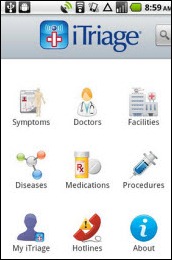
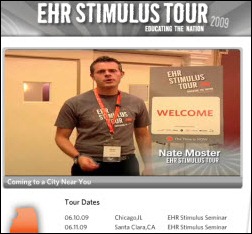


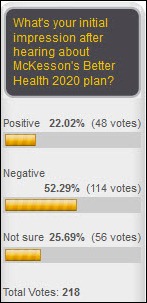




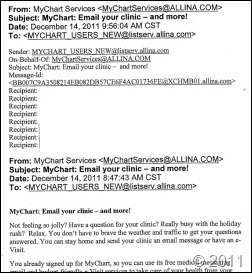









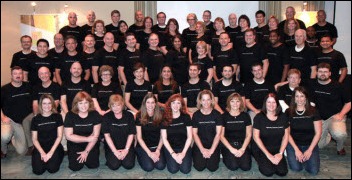




While they will pilot, my sources tell me HCA is struggling with the idea of Epic company-wide idea because they’ll give up too much control and Epic is likely to require community integration that may go against HCA’s strategic goals (do any for-profits use Epic?). Selecting Epic now is a 20 year decision and, I’m told, they are reluctant to give up so much control to Epic for such a long time. Wall Street won’t understand when HCA says ‘we can’t do that with the systems we have’. Cost is an issue too. This it total speculation… I wouldn’t be surprised if they used an Epic pilot to get ideas, not as a serious look for company-wide use.
Nice pics of the contributions and holiday activities of your sponsors. Congrats to them for the work they do!
Also, as far as NashvilleAware’s comment – this Christmas goose is cooked. HCA is going Epic. Likely just a courtesy to those inplace vendors giving them time to come to grips with how they’ll deal with the change in revenue sources. HCA is a good match for Epic and the Epic history of super scalable architectures meets a need that Meditech never could.
Thanks for sharing the various ‘give back’ events….those of us fortunate enough to have good jobs in healthcare and all the ‘things’ we have need to take a little time to help those less fortunate. Some great ideas that you shared. May have to steal a few in the future!
Couldn’t agree with you more on the Dr title thing, especially the red flag of what you so aptly referred to as bookending.
Hey “Mr.” H –
Your just jealous of people who are much more better educated that you are! Before I got my titles and things, lots of people used to misunderestimate me all the time, but not anymore! Even though you are only a little Mr, don’t be bitter – get better! I know some guy whose got a lot of initials and things – he fixed me he can help you to. I also got a hair transplant, which also helped.
The current state of affairs in clinical IT is pathetic. We are forever creating work arounds because what Congressman Price has espoused has not been accomplished. Our doctors remain maximally frustraed. Huge wastes of time. I guess Newt had too much influence looking out for the interests of his contributors.
Tom Price is a little bit “Pollyanna-ish” in his idea of what government should do in the HITECH world-” just pick a platform everyone is to use. Everybody needs to have a system that allows it to speak to another system within these parameters”. That hasn’t even worked out in the electronic claims area – we still require multiple clearinghouses and that has been going on for over 25 years !!
Dr. Rivera, I’m not sure everyone will get it, but that was awesome.
Weird News Andy rocks and thanks for the reminder of a spirit of Christmas. There are smiles in all of the photos and a reminder of what we should do the whole year – help one another and see the good.
Would be surprised if HCA goes Epic without getting a huge discount. They’re known to play hardball and are willing to walk away from the table if they don’t get their way. They’re not going to plunk down $500+ million – conservative estimate – to outfit their 270 hospitals with Epic. Still wondering how HCA is going to attain that mythic Epic scalability when Kaiser couldn’t. HCA’s not going to throw Kaiser-type money at this problem, when spending half as much can get the same stimulus dollars on their balance sheet. There’s a reason none of the for-profits use Epic, and the only way that changes is with a massive software discount. Not to say HCA won’t end up installing Epic when it’s all said and done, but if they do they’ll get it at a price that makes the other Epic customers weep. If they don’t, watch their share price tank.